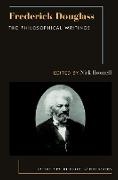Read more
Frederick Douglass' fame as an activist and abolitionist often eclipses his less appreciated work as a political philosopher. Indeed, few people know that he declared in an 1867 speech: "From this little bit of experience, slave experience, I have elaborated quite a lengthy chapter of political philosophy, applicable to the American people." However, Douglass did not develop this philosophy systematically. Instead, he expressed it in myriad moments and fragments throughout his writings, and for this reason it is often overlooked, even by scholars of philosophy.
The philosophy Douglass drew from his experience of enslavement and anti-Black racism is as relevant today as it was in his lifetime. More than any other abolitionist and Black activist of his day, Douglass saw that the slavery system was both the cause and the consequence of virulent anti-Black racism. Seeking to understand and repudiate not just racism, but also sexism and nativism, he developed a powerful theory of human nature, human powers, and human dignity that he subsequently wove into a profound theory of democracy and democratic citizenship. This collection, carefully curated by editor Nick Bromell, makes Douglass's philosophical ideas available and compelling to a new generation of readers.
List of contents
- Series Editors' Foreword
- Abbreviations
- Introduction
- PART I: KEY WORDS IN DOUGLASS'S POLITICAL PHILOSOPHY
- 1. Humanity
- 2. Power
- 3. Dignity
- 4. Freedom
- 5. Standpoint
- 6. Prejudice against Color
- 7. Struggle
- 8. Soul
- PART II: AUTOBIOGRAPHY AND FICTION
- My Bondage and My Freedom
- The Heroic Slave
- PART III: EDITORIALS, LECTURES, SPEECHES
- 1. "Our Paper and Its Prospects" and "To Our Oppressed Countrymen"
- 2. "The Rights of Women"
- 3. "The Revolution of 1848"
- 4. "The Destiny of Colored Americans"
- 5. "Prejudice Against Color"
- 6. "Is Civil Government Right?"
- 7. "What to the Slave is the Fourth of July?"
- 8. "A Nation in the Midst of a Nation"
- 9. "The Claims of the Negro Ethnologically Considered"
- 10. "Is it Right and Wise to Kill a Kidnapper?"
- 11. "The Dred Scott Decision"
- 12. "Pictures and Progress"
- 13. "What the Black Man Wants"
- 14. "Sources of Danger to the Republic"
- 15. "Our Composite Nationality"
- 16. "Let the Negro Alone"
- 17. "Woman Suffrage Movement" and "Woman and the Ballot"
- 18. "Oration Delivered on the Occasion of the Unveiling of the Freedmen's Monument in
- Memory of Abraham Lincoln"
- 19. "Speech at the Mass Meeting at Lincoln Hall, Washington, D.C."
- 20. "'It Moves,' or the Philosophy of Reform"
- 21. "The Nation's Problem"
- 22. "Self-Made Men"
- 23. "Lessons of the Hour"
- Selected Bibliography
- Index
About the author
Nick Bromell focuses on historical and cultural constructions of what counts as "knowledge" and "knowing." He is the author of four books, most recently
The Time Is Always Now: Black Thought and the Transformation of US Democracy, and
The Powers of Dignity: The Black Political Philosophy of Frederick Douglass. His research has appeared in numerous academic journals, including
American Quarterly,
Critical Philosophy of Race, and
Political Theory. He is the founding editor of
The Boston Review, a former president of the New England American Studies Association, and Professor Emeritus at University of Massachusetts Amherst.

